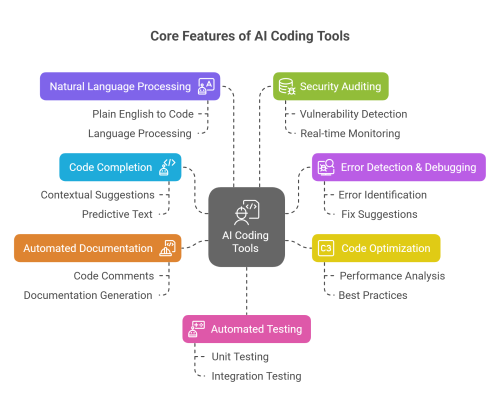The landscape of software development has changed drastically with the introduction of Artificial Intelligence (AI). AI-powered tools are now assisting developers in writing, debugging, and optimizing code, making development faster and more efficient. In 2025, AI coding assistants have become indispensable for developers, helping them streamline workflows and reduce human error.
AI has been integrated into coding processes to automate tedious tasks, allowing developers to focus on higher-level problem-solving. With AI’s ability to analyze vast amounts of data and recognize patterns, developers now have tools that not only complete code but also enhance its quality. AI tools are also contributing to the rise of low-code and no-code platforms, making software development more accessible.
Importance of AI Tools
AI coding tools are essential for developers due to their ability to automate repetitive tasks, suggest optimizations, and even write entire blocks of code based on simple prompts. These tools improve efficiency, reduce development time, and help developers focus on more complex and creative aspects of software engineering.
In 2025, the demand for faster and more efficient development cycles has made AI-powered coding assistants a necessity. Businesses leveraging AI tools can accelerate product development, optimize workflows, and ensure higher code accuracy. These tools enable collaborative coding, allowing teams to work together seamlessly, regardless of geographic location.
Historical Background
Evolution of AI in Development
AI has been gradually transforming the development industry for years. Early implementations included basic syntax suggestions and auto-completions, but today, AI tools can write, debug, and optimize code with minimal human intervention. The journey from simple code linters to sophisticated AI-powered IDEs has been remarkable.
AI was first introduced in coding in the form of rule-based programming assistants. However, with the emergence of machine learning, tools began to improve their suggestions based on real-world coding practices. Over time, AI systems became more sophisticated, capable of offering context-aware suggestions, code refactoring options, and even detecting security vulnerabilities.
Milestones in AI Coding Tools
- 2017: Introduction of AI-powered auto-completion in IDEs.
- 2020: The rise of AI-driven pair programming tools.
- 2023: Generative AI models like ChatGPT and GitHub Copilot revolutionize software development.
- 2025: AI coding tools become fully integrated into CI/CD pipelines, optimizing code quality at every step.
The widespread adoption of deep learning models in coding assistance has paved the way for significant improvements in AI-driven development. By 2025, AI has moved beyond simple code suggestions to active participation in decision-making, refactoring, and optimizing entire projects.
Key Components or Pillars

Core Features of AI Coding Tools
- Code Completion: Intelligent auto-suggestions based on context.
- Error Detection & Debugging: AI-powered debugging tools that suggest fixes.
- Code Optimization: Performance improvements based on best practices.
- Automated Documentation: Generating documentation from code.
- Natural Language Processing: Writing code from plain English instructions.
- Security Auditing: Detecting vulnerabilities in real-time.
- Automated Testing: AI-assisted unit and integration test generation.
- Version Control Integration: AI-powered recommendations for commit messages and branching strategies.
Integration Capabilities
Modern AI coding assistants seamlessly integrate with popular development environments such as:
- Visual Studio Code
- JetBrains IntelliJ IDEA
- GitHub & GitLab
- CI/CD pipelines
- Cloud computing platforms
- Agile and DevOps tools
AI tools now function as a vital part of DevOps, ensuring continuous code improvement, real-time error detection, and security enhancements.
Top 10 Best AI Tools for Coding in 2025
1. GitHub Copilot
A leading AI coding assistant developed by OpenAI and GitHub, GitHub Copilot suggests entire lines or blocks of code in real-time based on comments and existing code structure.
2. Tabnine
An AI-powered autocompletion tool that enhances coding efficiency by predicting and completing entire lines of code with high accuracy.
3. CodeWhisperer (AWS)
Amazon’s AI-powered coding assistant, which integrates seamlessly with AWS services and provides intelligent suggestions for cloud-based development.
4. Kite
A powerful AI coding assistant with deep-learning-powered code completions that support multiple programming languages and major IDEs.
5. OpenAI Codex
The AI model that powers GitHub Copilot, OpenAI Codex can generate complex code snippets based on natural language instructions.
6. Ponicode
An AI-powered unit testing tool that automatically generates test cases, ensuring code reliability and efficiency.
7. Sourcery
A tool that enhances Python development by analyzing and suggesting refactored, optimized versions of existing code.
8. DeepCode
An AI-powered code review tool that identifies security vulnerabilities, inefficiencies, and potential bugs in the codebase.
9. PyCharm AI Assistant
JetBrains’ AI-powered assistant integrated into PyCharm, providing advanced coding suggestions, debugging assistance, and smart refactoring.
10. Replit Ghostwriter
An AI-driven code completion tool designed for the Replit online IDE, providing real-time coding suggestions for web and software development projects.
Practical Applications / Real-World Examples
AI Tools in Action
- Startups: AI helps small teams scale their development efforts by automating repetitive tasks.
- Enterprise Software: Large organizations use AI to maintain code consistency across teams.
- Open Source Projects: AI assists contributors by generating pull request suggestions and writing tests.
- Game Development: AI accelerates development cycles by generating in-game logic and automating animations.
- Healthcare Tech: AI assists in developing secure and efficient medical software.
Case Studies
- Google’s AI-assisted development: Google has implemented AI-driven tools that optimize code in their vast software ecosystem.
- Tesla’s self-driving algorithms: AI-driven coding has played a key role in improving Tesla’s software for autonomous vehicles.
- Financial institutions: AI helps detect anomalies in codebases, reducing vulnerabilities in fintech applications.
- E-commerce platforms: AI enables personalized recommendation engines with minimal manual coding.
Challenges or Issues
Limitations of AI Tools
- Context Limitations: AI struggles with highly complex logic requiring human intuition.
- Dependency on Training Data: AI-generated suggestions depend on existing knowledge, limiting innovation.
- Learning Curve: Developers need time to effectively integrate AI tools into their workflow.
- Security Risks: AI-generated code might introduce vulnerabilities.
Ethical Concerns
- Code Ownership: Who owns AI-generated code?
- Bias in AI: AI models may inherit biases from training data.
- Security Risks: AI tools must ensure that generated code does not introduce security vulnerabilities.
Expert Opinions or Insights
Industry Leaders’ Perspectives
Many AI and software development experts see AI tools as invaluable assets for improving productivity. However, they caution against over-reliance, emphasizing that human oversight remains essential.
Future Predictions
- AI will evolve to write entire applications from natural language prompts.
- More sophisticated AI debugging tools will be developed.
- AI-generated code will become indistinguishable from human-written code.
- AI will contribute to self-improving software that can optimize itself over time.
Best Practices or Tips
Effective Use of AI Tools
- Use AI tools as a coding assistant, not a replacement.
- Always review AI-generated code for errors.
- Combine AI suggestions with human expertise for optimal results.
- Establish security checks to validate AI-generated code.
Staying Updated
- Follow AI research in development.
- Experiment with new AI tools as they emerge.
- Engage with AI development communities.
- Regularly attend AI and software development conferences.
Benefits of Understanding AI Tools
Efficiency and Productivity
AI significantly reduces coding time by automating mundane tasks and optimizing workflows.
Innovation and Creativity
With AI handling repetitive tasks, developers can focus on creative problem-solving and innovation.
Common Misconceptions or FAQs
What are AI coding tools?
AI coding tools use machine learning and AI models to assist developers with code writing, debugging, and optimization.
How do AI tools improve coding efficiency?
They automate repetitive tasks, suggest improvements, and provide real-time debugging assistance.
Are AI tools suitable for beginners in coding?
Yes, they help beginners learn by providing suggestions and explaining code snippets.
Can AI tools replace human developers?
No, AI tools assist but cannot replace human intuition, creativity, and problem-solving skills.
References & Further Reading
AI Tools for Developers: A 2025 Perspective – Tech Blog
The Future of AI in Software Development – Educational Platform
AI and Machine Learning in Coding – Industry Update
Disclaimer: The information provided is for educational purposes. Always consult with professionals for specific advice.

